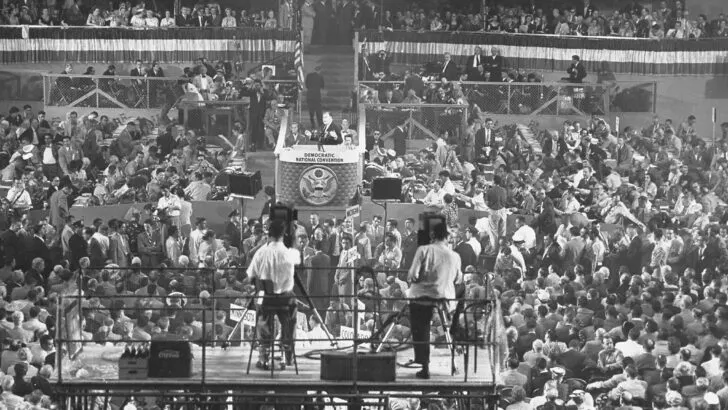A brokered convention takes place when no one candidate wins a majority delegates during the presidential primary to earn their party’s nomination in the first vote at the nominating conference.
When that happens, the nomination is “brokered,” or determined through horse trading and backroom deals.
History of Brokered Conventions
Brokered conventions, also called deliberative or contested conventions, were the norm in the United States until the second half of the 20th century.
At that time, “party bosses” wielded enormous power, and candidates were often chosen after hours of deal-making in smoke-filled rooms.
Warren G. Harding, for example, was famously selected to be the Republican presidential candidate after a series of conclaves by party leaders.
And in 1924, Democratic delegates took 103 ballots to select the little-known candidate John Davis.
The most recent brokered convention was the Democratic convention of 1952, from which Adlai Stevenson emerged as the winner.
In 1948, the Republican party held a brokered convention and selected Thomas Dewey as the party’s candidate.

Modern conventions
By 1972, almost every state in the union had established either a primary election or a caucus system, making it possible for voters to choose the candidate they wanted to run for their party.
The brokered convention became irrelevant, since primary votes and caucuses meant that there was always a clear frontrunner by the time a party held its political convention.
Both of the major political parties also allow candidates to win the nomination with a simple majority, rather than a two thirds majority; this makes it easier to determine a frontrunner as well.
Analysts have also pointed out that the cost of modern elections, and the 24-hour news cycle, also means that all but the most popular candidates will drop out before they get to the convention.
As a result, the winner is always clear by the time a party holds its political convention.
Modern political conventions are often viewed as spectacles, rather than as formative political events.
At the same time, pundits and political junkies still love to talk about the possibility of a brokered convention.
In 2016, there was a lot of speculation that Republicans might have a brokered convention.
The speculation largely grew out of the idea that Republican leaders wanted to “stop” Donald Trump from winning the party’s nomination to the presidency and were troubled by signs that “favorite sons” like Jeb Bush were losing out to Trump. In the end, the Republican convention was not brokered.
No more brokers
But often a brokered convention is mostly just a political junkie’s fantasy.
The modern party primary system almost always determines an overwhelming winner of delegates.
And as David Frum notes, it’s hard to imagine a “brokered convention” when there is no such thing as political “brokers” any more.
Elected delegates to a convention aren’t going to be swayed by political leaders deciding the nominee in a backroom.
More on the “Brokered Convention”
A convention in which the presidential nominee is chosen at the convention itself—in other words, every journalist’s dream.
It’s an extreme understatement to say political reporters are weary of the slickly produced coronations that occur every four years. A brokered convention would occur if none of the double-digit GOP field won enough delegates to claim the party’s nomination at the 2016 Republican National Convention in Cleveland.
As such, it’s the subject of endless speculative articles. “There hasn’t been a brokered convention since 1976, but the strength of the GOP field, when coupled with the proliferation of super PACs, increases the chances that several candidates could show up in Cleveland next July with an army of delegates at their backs,” National Review said in May 2015.33
In fact, the 1976 convention technically wasn’t brokered—but it did begin without the nominee having been selected in the primaries. President Gerald Ford, who arrived at the convention with a slight lead in delegates over Ronald Reagan, won enough support on the first ballot at the convention to prevail. There hasn’t been actual multiround voting at a national convention since Democrats nominated Adlai Stevenson in 1952 on the third round of balloting.
Brokered conventions used to be the norm in presidential politics. Nineteenth-century presidents Franklin Pierce and James Garfield, among others, got to the White House that way. Woodrow Wilson also came out on top in a protracted 1912 Democratic National Convention floor fight. But both parties have adopted nomination rules since 1968 that make brokered conventions less likely.
From Doubletalk © 2016 Chuck McCutcheon and David Mark.
Use of “Brokered Convention” in a sentence
- The absence of a clear frontrunner in the primary race increased the likelihood of a brokered convention, where party leaders and delegates would negotiate and make decisions on the nominee during the convention.
- As the delegate count remained closely contested among the candidates, speculations grew about the potential for a brokered convention, with multiple rounds of voting required to determine the party’s nominee.
- The party officials were preparing for a potential brokered convention by strategizing behind the scenes, as they anticipated the need for delicate negotiations and compromise to unite the party around a candidate.